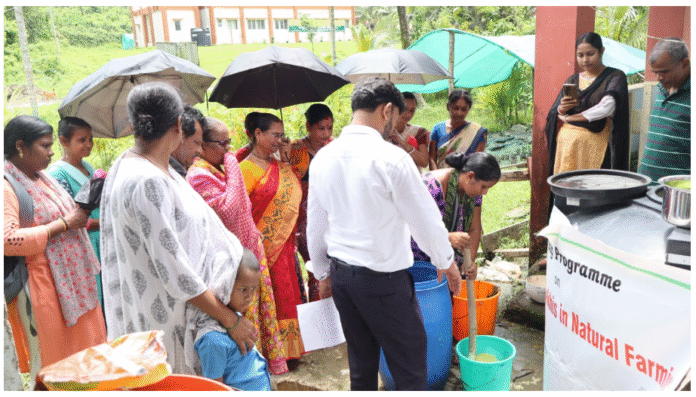Sri Vijaya Puram, July 2: In a focused effort to make rural farming more self-reliant and sustainable, a one-day training programme was organised at ICAR-Krishi Vigyan Kendra (KVK), Nimbuder, on July 1 to skill grassroots women farmers, known as Krishi Sakhis, in natural farming techniques. The initiative aims to equip women with low-cost, eco-friendly agricultural knowledge tailored to the unique challenges of the island ecosystem.
The training session, part of an ongoing drive to promote chemical-free farming in North and Middle Andaman, brought together 21 rural women from various villages. Officials said the programme was designed to not only reduce farmers’ dependence on expensive chemical inputs but also strengthen the role of women in community-based agricultural transformation.
The day began with a session by Rakesh Dawar, Subject Matter Specialist (Agronomy), who laid out the rationale behind the shift to natural farming. Stressing the need for practices that protect soil health and reduce production costs, he said adopting such techniques was vital to improving the long-term sustainability of small and marginal farms in the region.
Manoj Kumar, Subject Matter Specialist (Agricultural Engineering), delivered a technical lecture highlighting the practical role of natural farming in an island environment where resources are limited. He said sustainable, low-input practices were the only viable way forward for regions like Andaman, where transporting commercial inputs adds to financial and logistical challenges for farmers.
The day also featured expert insights from Shubham Debroy, Subject Matter Specialist (Aquaculture), who outlined the core components of natural farming, while Yatharth Sharma, Subject Matter Specialist (Home Science), discussed the nutritional and community health benefits of switching to organic produce.
Post-lunch, the training took a practical turn with live demonstrations on how to prepare and use traditional natural farming inputs like Beejamrit (a natural seed treatment solution), Jeevamrit (a microbial inoculant for soil), Neemastra, and Agniastra (botanical bio-pesticides). Participants were taught to prepare these using locally available materials and shown the proper application techniques and dosage.
The KrishiSakhis, many of whom have limited access to technical agricultural knowledge, welcomed the hands-on learning approach. Several participants expressed confidence in taking the practices back to their villages and promoting them as viable alternatives to chemical farming.
Officials present at the training said the goal was to create a multiplier effect, where each KrishiSakhi would serve as a local ambassador of natural farming in her community, gradually transforming agricultural habits across the island chain.
The programme was conducted under the supervision of V. Damodaran, Senior Scientist and Head, KVK, North and Middle Andaman, with overall guidance from Eaknath B. Chakurkar, Director, ICAR-CIARI, Sri Vijaya Puram.
The training is part of a larger strategy to make Andaman’s farming sector less dependent on imports and more aligned with ecological principles, officials added. It also aligns with national-level efforts to boost organic farming and empower women-led farm enterprises in rural India.





